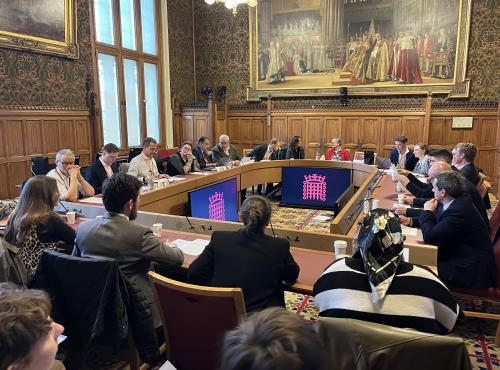The Environment Bill returned but the question remains: will it deliver world-leading environmental protection as pledged?
After a long absence of over half a year, the Environment Bill finally returned to Parliament in November with a recommencement of Committee Stage meetings after a nearly eight month hiatus.
With the UK having to redefine its legal foundations for environmental matters post-Brexit, the Environment Bill is a crucial milestone to set the UK’s new environmental framework and accomplish the government’s manifesto commitment to protect and enhance natural environment. Yet, the rocky passage of the Bill has raised major concerns about whether the Bill will become law before the end of the transition period, leaving major gaps in the UK’s environmental governance framework. The Public Bill Committee has now reported back– just over a month before the end of the transition period. Having the Bill passed on time will likely require a highly sympathetic reading in the Lords.
The Bill’s delay is not the only reason why doubts arose about its capacity to provide the world-leading environmental standards and protections Government has pledged. Concerns were raised about the independence of the planned Office for Environmental Protection (OEP), the adherence to environmental principles, as well as the Bill’s scope on waste and resource efficiency to mention a few examples. These are issues that will need to be addressed to ensure the Bill’s smooth passage ahead of the New Year deadline.
In our effort to help strengthen the Bill, in March 2020, shortly after the Bill’s Second Reading in the Commons, we held a roundtable in Parliament with the All-Party Parliamentary Sustainable Resource Group (APSRG) to discuss potential amendments to the Environment Bill with MPs, peers and representatives from the waste and resources, packaging and retail sectors, environmental NGOs, and a body representing local authorities.
Based on the session we highlighted a number of areas in which amendments should be made to the Bill and submitted written evidence to the Public Bill Committee. As our submission emphasised, we welcome the Environment Bill as a tool to provide the UK with a new legal foundation for environmental governance. But to ensure that the UK remains a world leader in environmental protection now that it left the European Union, as well as rectify the shortcomings in the existing legislation and policy framework, our submission asked for the Bill to be strengthened to provide the gold standard environmental legislation Government promised.
As a summary, our submission asked to:
- Strengthen the language of the Bill to make it ‘the duty’ of the Secretary of State to act, ensuring that the powers the Bill grants are fully leveraged – mirroring the language of the Climate Change Act 2008.
- Ensure that Ministers have to apply, rather than merely have due regard to environmental principles.
- Increase the leverage of the OEP and guarantee its ability to hold the Government to account. The Bill should grant the OEP the power to take legal action when absolutely necessary, requiring that the body is independent of Government and not under the sponsorship of any one Department or Secretary of State. Instead, the Bill should strengthen the links between the UK Parliament and the OEP to increase the independence of the latter.
- Strengthen the language of the Bill in relation to resource efficiency targets by committing to a series of more specific targets, including: consumption reduction targets, material specific collection and reprocessing targets, and split international export/domestic reprocessing targets (increasing to 100% domestic reprocessing by 2030).
- Further commitment from the government that in addition to responsibility for covering end-of-life costs, emphasis will be put on practices higher up the waste hierarchy when implementing producer responsibility obligations.
- Introduce mandatory labelling and provide more transparency of what happens to materials after their end of life.
- Make Deposit Return Schemes (DRS) consistent across the UK.
- Introduce charges on any unnecessary single use item, regardless of material.
- Eliminate the export of recyclable plastic waste by 2030. In the meantime, introduce clear quality assurance criteria to be met by recipient countries of UK plastic waste exports, and ensure that authorities overseeing these regulations have sufficient capacity and funding to enforce them.
- Introduce an end use register for all recycled waste created.
- Include a commitment to consider the net zero emissions and biodiversity recovery targets.
- Change the language from ‘Drainage and Sewerage Management Plan’ to ‘Drainage and Wastewater Management Plans’, to ensure that stakeholders with a wider focus than sewerage need to publish these plans.
- With regards to water quality, ensure that the Secretary of State does not have powers to modify the standards by which the chemical status of water bodies are measured and the substances that are measured to determine the health of these water bodies without public consultation or scientific review.
In light of remaining concerns about the Bill’s capacity to maintain and enhance environmental protections, we ask Parliamentarians in both Houses to use all remaining opportunities to strengthen the Environment Bill and make sure the UK’s environmental governance framework does indeed provide world-leading environmental standards. We submitted this evidence with the aim to help Parliamentarians strengthen the Environment Bill and we will strive to continue working with MPs and Peers, using all opportunities to ensure gold-standard environmental legislation post-Brexit.
To view the full version of the written evidence submitted by Policy Connect to the Public Bill Committee, please click here.



